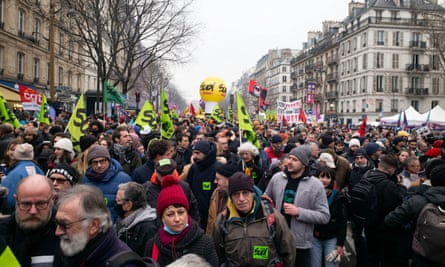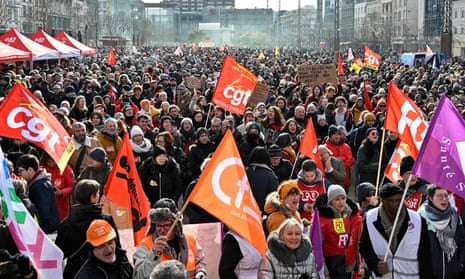More than 1 million people have taken part in demonstrations across France as transport, schools and refineries were hit by strikes in protest at Emmanuel Macron’s unpopular plans to raise the retirement age by two years to 64.
The interior ministry said 1.12 million people protested nationwide on Thursday, with 80,000 taking part in the biggest rally in Paris. Trade unions said the figure was even higher.
Police made arrests on the edges of the march in central Paris amid clashes with officers in the early afternoon. Police said 15 people were arrested before the Paris march and 15 during it, for offences such as carrying illegal weapons or throwing projectiles. Shopkeepers around the Place de la République boarded up windows and shopfronts after the authorities warned of a possibility of vandalism after the marches or black bloc-style tactics.
Local and regional train services across France ground almost to a standstill, and public transport in cities including Paris was “very disrupted”, according to operators.
Many primary schools closed for the day. Authorities estimated 40% of primary teachers and more than 30% of secondary teachers went on strike. Unions said participation was higher, at 70% in primary schools.
Public service radio and television were also disrupted, and some theatres and museums closed. Some refinery shipments were blocked and energy output lowered.

The 24-hour strike and protests in 200 towns and cities are the first big test for Macron since his re-election against his far-right rival Marine Le Pen last spring.
Macron has made the pensions issue a marker of his aim to transform France and overhaul its social model and welfare system. He insists he will deliver his key election pledge to change the French pension system – raising the retirement age for most people to 64 from 62 and increasing the years of contributions required for a full pension. Opinion polls have shown most French people oppose these proposals and view them as unjust, even if many agree with a need for change.
At a French-Spanish summit in Barcelona, Macron defended what he called a “fair and responsible reform” and said he hoped the protests would not descend into violence.
The main question for Macron and the government is whether trade unions, who joined together in a rare and historic united front for t 24-hour strike, will harness public anger into a broader social protest movement and continue industrial action. Some high-school students blockaded lycées on Thursday morning, as the government fears young people in schools and universities could lead their own protests.

Macron remains conscious of the legacy of the gilets jaunes (yellow vests) anti-government protest movement that erupted in 2018 from the ground up, without trade union leadership, taking the government by surprise. It is uncertain whether the anger at pension change and the cost of living could swell the current protests. In 2019, a previous attempt at pension change by Macron was met with the longest-running rail strikes in France since May 1968, and those plans for a pensions overhaul were put aside during the Covid pandemic.
At the Paris demonstration, Nathalie Ramos, 48, a member of the leftwing CGT union at the city’s Picasso museum, said: “A strike always means there has been a failure by the government, we hope they will listen to this.”
after newsletter promotion
Frédéric Dortomb, 52, a worker at a private insurance firm, had voted for Macron’s re-election. He said: “Macron argues that these pension changes were in his manifesto. But the majority of people didn’t vote Macron for that reason, they voted to keep out Le Pen. Macron said he would review his manifesto in that light, but he hasn’t. These pension decisions are badly thought out without enough consultation.”
Véronique, 61, a teacher at a high school in the south of Paris, said: “Teaching is physically and mentally tiring, our salaries have effectively shrunk due to inflation and now we worry we’ll get old and ill before we’re able to stop work.”
Philippe Martinez, head of the CGT union, told the broadcaster Public Senat that the planned pension change “bundles together everyone’s dissatisfaction” with the government. He said the rare united front among workers’ representatives showed the problem was very serious. He called the pension changes “unjust … dogmatic and ideological”.
Laurent Berger, the head of France’s largest union, the moderate CFDT, told BFMTV: “There is a lot of anger.”
The pension changes still need to go through parliament, where Macron’s centrist grouping has lost its absolute majority. The government is hoping to pass the bill swiftly with the support of lawmakers from the rightwing Les Républicains.
The government says it wants to keep public spending in check. “This reform is necessary and fair,” the labour minister, Olivier Dussopt, told LCI TV.
The labour ministry estimates that pushing back the retirement age by two years and extending the paying-in period would bring an additional €17.7bn (£15.5bn) in pension contributions, allowing the system to break even by 2027.
Unions said ordinary workers would be hit and the changes were unfair.
